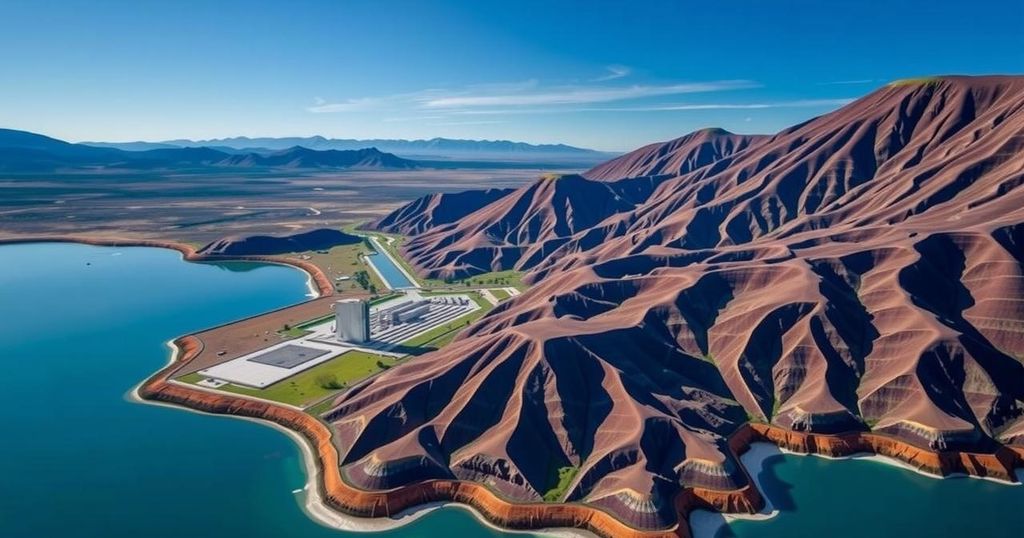Bolivia has signed a $1 billion deal with China’s CBC to develop lithium carbonate plants in the Uyuni salt flats. The plants will use advanced direct lithium extraction technology and are expected to produce 35,000 metric tonnes annually. Despite this significant move, the project faces political and legislative hurdles, with Bolivia’s long-term resource control and geopolitical stability at stake.
Bolivia has successfully secured a significant $1 billion agreement with China’s CBC, a subsidiary of the prominent battery manufacturer CATL, aimed at constructing two lithium carbonate plants in the Uyuni salt flats. Announced on November 26, this partnership seeks to bolster Bolivia’s position in the global lithium market, addressing its historical difficulties in leveraging its extensive lithium reserves. The facilities are projected to generate a total of 35,000 metric tonnes of lithium annually, employing innovative direct lithium extraction (DLE) technology, which promises a more efficient and eco-friendly production process.
Under the arrangement, Bolivia’s state-owned company, YLB, is set to retain a 51% controlling interest, ensuring that the nation retains authority over its valuable resources. President Luis Arce characterized the agreement as a pivotal step toward establishing Bolivia as a major influencer in the global lithium landscape, particularly regarding pricing structures. Nevertheless, this ambitious plan is shadowed by significant political and logistical challenges, as legislative approval will be necessary, and the existing divisions within the legislature may hinder swift progress, especially with the national elections approaching in 2025.
This recent partnership follows a prior agreement valued at $976 million with Russia’s Rosatom-owned Uranium One Group, also focused on leveraging DLE technology to produce 14,000 tonnes of lithium annually. Last year saw the selection of Uranium One, along with CBC and Citic Guoan Group, for the development of pilot DLE facilities, which are anticipated to transition into larger-scale operations over time. The Bolivian government has set an ambitious target to export 50,000 tonnes of lithium carbonate equivalent each year.
Nonetheless, the dependence on investments from Chinese and Russian entities raises concerns about Bolivia’s long-term economic and geopolitical stability. While these collaborations bring essential funding and advanced technologies, they may inadvertently constrain Bolivia’s control over its resources, potentially leading to unfavorable conditions that might limit the benefits for local stakeholders and the transfer of technology. Such constraints could jeopardize Bolivia’s sovereignty over its lithium sector.
Despite holding the world’s largest lithium reserves, estimated at 23 million tonnes, Bolivia has struggled with production compared to regional counterparts like Chile and Argentina. Legacy issues, including inadequate infrastructure, regulatory challenges, and political unrest, have impeded advancement in this sector, eliciting skepticism from potential investors. Since the 1990s, the nation has faced barriers in industrial development, grappling with bureaucratic inertia and logistical difficulties. Future progress will necessitate navigating complex environmental laws and securing legislative approval in a politically fragmented landscape, particularly with the impending 2025 general elections on the horizon.
Bolivia boasts the largest known lithium reserves globally, positioning itself as a potential leader in the lithium market—a critical component in battery production. However, the country has historically failed to capitalize on this opportunity owing to various systemic obstacles, including lack of infrastructure, regulatory complexities, and political instability. Recent agreements with foreign investors signal a new strategy aimed at overcoming these challenges and harnessing Bolivia’s lithium resources for international markets, but concerns regarding dependency on foreign powers persist as the nation seeks to assert its sovereignty over its natural resources.
In summary, Bolivia’s recent $1 billion agreement with China’s CBC marks a significant step towards establishing a robust lithium processing industry within the country. However, the successful implementation of this project is contingent on overcoming existing political and logistical hurdles, all while maintaining a critical eye on the implications of international partnerships for Bolivia’s long-term resource sovereignty. As the nation navigates its path forward, the balance between opportunity and dependency will be pivotal to its future success in the global lithium market.
Original Source: www.intellinews.com






